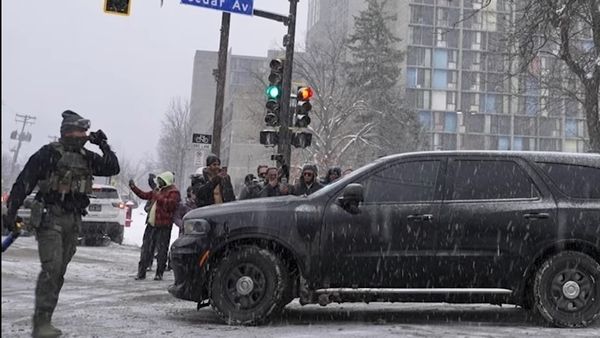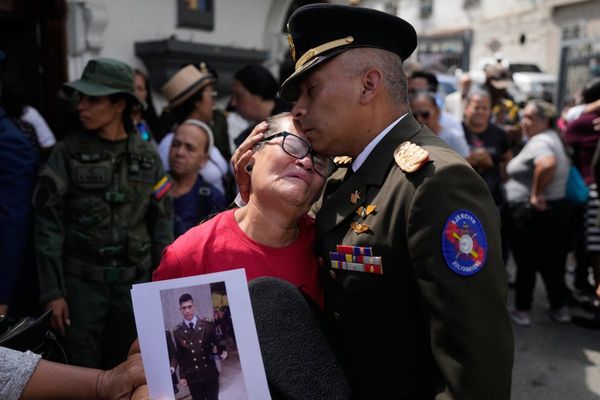
Queer film exploded like a glitter cannon in the 1990s, sending sparkling product raining down in every direction. Trans lives hit the screen in Orlando and Boys Don’t Cry, alongside dynamic bulletins from the Black queer experience (The Watermelon Woman, Young Soul Rebels, Chocolate Babies). We had jubilant celebrations of drag with Paris Is Burning and The Adventures of Priscilla, Queen of the Desert, provocations from New Queer Cinema in the shape of Poison, Swoon and Edward II; there were auteurist masterpieces (Beau Travail, Happy Together) and timeless coming-out stories (Beautiful Thing, Show Me Love). The Wachowski sisters, Lisa Cholodenko, François Ozon and Bruce LaBruce all made their debuts; Pedro Almodóvar and Gus Van Sant went stratospheric. Benefiting from a surge in the fortunes of independent cinema, and a defined focus for anger brought about by Aids activism, queer film was a commercial force for the first time.
The decade can in one sense be reduced to a tale of two kisses. First came the smooch that never was, in the 1993 Oscar-winner Philadelphia, the first Hollywood movie about Aids after nearly a decade of independent ones such as Buddies, Parting Glances and Longtime Companion (each of which was made by a director who later died of complications from the disease). Despite Tom Hanks and Antonio Banderas in Philadelphia playing lovers in a long-term relationship, their public displays of affection are restricted to a single slow dance at a party. Compare this to Dakan (Destiny), a raw love story between male high-school friends, which was shot four years later in the west African country of Guinea. In the opening scene, two young men are making out in a convertible. There is no coy buildup or timid flirtation: these lovers are already snogging with a ferocity that makes the face-huggers from Alien look diffident.

Philadelphia might have been a commercially risky enterprise, but for those making Dakan, any jeopardy was immediate and physical: homosexuality was (and is) illegal in Guinea. The director, Mohamed Camara, had such difficulty finding actors for the lead roles that he begged his own brother, Mamady, to star. Mamady and his eventual on-screen partner kept their respective girlfriends nearby on set so that they could fall into the women’s arms for a replenishing kiss between takes. That may not sit well in our age of authentic casting, but it’s worth noting that an indignant passion endures in the film’s love scenes. There were occasions, too, when Camara found it necessary to sneak off after introducing screenings of Dakan to avoid butting heads with protesters. Djibril Diop Mambéty, the great Senegalese director of Touki Bouki, told him: “You can be sure that your career is over, but in 100 years, people will still talk about you.”
It looks now as if the gloomy first half of Mambéty’s prediction came true: 28 years on, Camara appears not to have made another feature. But the brighter second part is also on its way to being realised: Dakan is one of a batch of titles included in a new season at London’s Barbican, entitled Queer 90s: Cinema from a Decade of Radical Change. Its curator, Alex Davidson, has ventured far from the straight and narrow. “I love the New Queer Cinema but those films tend to be very North American-centric, whereas there were so many interesting things happening in other parts of the world,” he says. His selection includes Deepa Mehta’s 1996 lesbian love story Fire, which was the target of protests in India; the 1992 futuristic Super-8 dyke-punk romp Flaming Ears; Costa Brava (1995), which earned its director-star Marta Balletbò-Coll the title of “the Spanish Woody Allen”; and East Palace, West Palace (1996), a tense Chinese chamber piece about a young gay man and the cop who arrests him for cruising.

Ursula Puerrer, one of the three directors of Flaming Ears, says that the movie’s DIY aesthetic emerged from Vienna’s queer punk underground. “We all did music, live performance, painting,” she says. “Originally, I was asked to do the costumes for the film. Then it came to whether I could be on screen. Soon we were all doing everything. How can you tell it’s a no-budget movie? The actors still have paint from the backdrops on their hands.”
Though the film is set in 2700, I wonder if the punky, transgressive world it depicts reflects her life at the time. “Yes, one could say that. The dresses I wear I also wore on the street. The club in the film is full of our friends. Everything is exaggerated but it’s a total portrait of the lesbian scene at the beginning of the 1990s.” Flaming Ears is a collage of textures and techniques (live-action, stop-motion animation, toy miniatures), with an aesthetic somewhere between Jubilee and Escape from New York, as well as madcap dialogue (“My saliva heals the world’s evil!”) and a nonchalance about sex. Puerrer plays a horny pyromaniac. “When it was shown in Vienna, friends didn’t talk to me for weeks because they were shocked,” she admits. “They saw me as a perverted sex maniac.” Was she? “No! When we screened the restored version last year, it no longer seemed scandalous. But one guy in the audience said: ‘I think it’s still erotic.’ I loved that.”
The best-known of the directors in the Queer 90s season is Monika Treut, who has been making breezy accounts of queer life for nearly 40 years. Included here is her third picture, My Father Is Coming (1991), about a struggling German actor in New York who must pretend she is straight and successful when her father visits from home. Treut herself decamped to the US from Germany after her previous film, Virgin Machine, was spurned at home. “One review said: ‘This film destroys cinema,’” she recalls. “Older straight men especially hated my films with a vengeance.”

The older straight man in My Father Is Coming is no stick-in-the-mud. He frolics cheerfully with Annie Sprinkle, the sexologist and former sex worker who features in several of Treut’s films, and shoots the breeze with the shaman and body-piercer Fakir Musafar, who is suspended from hooks inserted into incisions in his skin. The concept of the body as personal playground, mode of expression and instrument of liberty runs through much of Treut’s work. “The body is just an envelope to the soul, and people should have a chance to become who they are,” says a trans character in My Father Is Coming, prefiguring one of the interviewees in Treut’s 1999 documentary Gendernauts, who argues that “my body belongs to me and I’m going to do what I want with it to make me happy. This flesh here is mine. I live here. I don’t have to pay a damage deposit.”
Treut was ahead of her time. But how does she feel looking back at the 1990s? “Nostalgic. The pre-internet way of making films was more difficult but more adventurous. And though I am glad things are more democratic now, I’m a bit nostalgic, too, for the time when queer people were outcasts.” She notes how casually the term “queer” is invoked today. “It used to be associated with activism: not agreeing with family values, having a different view of society. Now ‘queer’ is more like a fashionable way of going with the flow. I’d say 80% of the students I teach would call themselves queer without having had any real fights. Part of my work is to remind them of the political struggles from those days.”
When Balletbò-Coll co-wrote and directed Costa Brava, in which she plays a zesty Barcelona tour guide who falls for an Israeli-American woman, she was partly in denial about what she had made. “I’d get mad when people would call it a lesbian film,” she says. “I would reply: ‘No! I’ve made a comedy!’ I was crazy enough to want to be with the champions, not in some regional league. The film was a hit at festivals but I wanted to make it big in LA. It didn’t work out like that.”
Costa Brava’s failure to reach audiences is one of the mysteries that emerges from the Queer 90s season. Sure, the film is technically scrappy: it ends with an on-screen title card announcing that it was shot in 14 days, which Balletbò-Coll inserted so that viewers would “give me a break and be kind”. The director attributes its twitchy editing style to vanity: “Every time I saw my double-chin on screen, I’d cut. Cut, cut, cut! Jump-cuts all over the place!” But this was the decade of scratchy, no-budget indie comedies, both queer (Go Fish, Grief, Boyfriends) or otherwise (Clerks, El Mariachi). It reflects poorly on distributors and exhibitors that something as effervescent as Costa Brava couldn’t gain a foothold in the marketplace.

A white male bias was evident even in this supposedly progressive sector. “Will queers of colour ever get equal time?” wondered B Ruby Rich in the 1992 Village Voice article in which she coined the term New Queer Cinema. Included in her survey was a report from a lesbian pool party at the Amsterdam film festival where she quoted the director Pratibha Parmar’s observation that “there were more inflatables of colour in attendance than actual women of colour”. Rich praised the early video work of Cheryl Dunye, who would become, with the release of The Watermelon Woman in 1996, the first out Black lesbian director to receive theatrical distribution. That movie’s reputation continues to grow but Dunye’s film career fizzled out; she is now a successful TV director, with episodes of Bridgerton and Lovecraft Country to her name.
One of her contemporaries, the film-maker Stephen Winter, remembers bumping into her at festivals and screenings where “we were always walking around going: ‘Well, we’re the only Black people here again.’” Winter directed Chocolate Babies, a fiery, savage 1996 comedy about Black queer HIV+ terrorists on the rampage in New York, which was unfairly sidelined. It would be nearly 20 years before he made his second feature, Jason and Shirley, which imagined what went on behind the scenes of Shirley Clarke’s 1967 queer documentary Portrait of Jason.
“In general, it’s a miracle if a queer film-maker gets to make more than one film,” says Davidson. “If their first one isn’t a hit, people aren’t willing to take a chance on financing a second.” Treut has a formidable body of work behind her – she recently made Genderation, a two-decades-later followup to Gendernauts – but Puerrer, who became a video editor, made only one other feature after Flaming Ears. I ask her where I can see it but she tells me she no longer has a copy because her hard drive broke.
Ballètbo-Coll gave up directing in 2006 and now teaches chemistry. Do any of her students know they are being taught by the Spanish Woody Allen? “One student who had seen some of my last film said to me: ‘Hey, are you a dyke? Because I saw you kissing a woman!’ I told her: ‘This is not the time or the place!’ Ah, they are interested in anything except the curriculum.” At least she hasn’t lost sight of the reason she made Costa Brava. “It’s very simple,” she says. “I wanted to change the world.” And she did.
• Queer 90s: Cinema from a Decade of Radical Change is at the Barbican, London, from 6-29 June.







